BMW iX1 vs Skoda Elroq - Differences and prices compared
Compare performance (313 HP vs 340 HP), boot space and price (41800 £ vs 29100 £) at a glance. Find out which car is the better choice for you – BMW iX1 or Skoda Elroq?
Costs and Efficiency:
Looking at overall running costs, both models reveal some interesting differences in everyday economy.
Skoda Elroq has a convincingly advantage in terms of price – it starts at 29100 £, while the BMW iX1 costs 41800 £. That’s a price difference of around 12771 £.
In terms of energy consumption, the advantage goes to the Skoda Elroq: with 15.20 kWh per 100 km, it’s minimal more efficient than the BMW iX1 with 15.80 kWh. That’s a difference of about 0.60 kWh.
As for range, the Skoda Elroq performs slightly better – achieving up to 573 km, about 110 km more than the BMW iX1.
Engine and Performance:
Power, torque and acceleration are the classic benchmarks for car enthusiasts – and here, some clear differences start to show.
When it comes to engine power, the Skoda Elroq has a slight edge – offering 340 HP compared to 313 HP. That’s roughly 27 HP more horsepower.
In acceleration from 0 to 100 km/h, the Skoda Elroq is minimal quicker – completing the sprint in 5.40 s, while the BMW iX1 takes 5.60 s. That’s about 0.20 s faster.
There’s no difference in top speed – both reach 180 km/h.
There’s also a difference in torque: Skoda Elroq pulls distinct stronger with 679 Nm compared to 494 Nm. That’s about 185 Nm difference.
Space and Everyday Use:
Cabin size, boot volume and payload all play a role in everyday practicality. Here, comfort and flexibility make the difference.
Both vehicles offer seating for 5 people.
In curb weight, BMW iX1 is barely noticeable lighter – 1940 kg compared to 1953 kg. The difference is around 13 kg.
In terms of boot space, the BMW iX1 offers minimal more room – 490 L compared to 470 L. That’s a difference of about 20 L.
In maximum load capacity, the Skoda Elroq performs slight better – up to 1580 L, which is about 85 L more than the BMW iX1.
When it comes to payload, Skoda Elroq barely noticeable takes the win – 531 kg compared to 495 kg. That’s a difference of about 36 kg.
Who comes out on top?
Overall, the Skoda Elroq shows itself to be outperforms in nearly all aspects and secures the title of DriveDuel Champion.
It convinces with the more balanced overall package and proves to be the more versatile choice for everyday use.
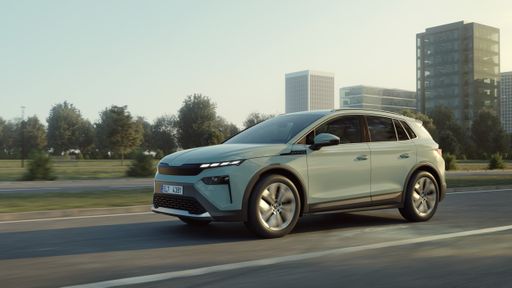
Skoda Elroq
Costs and Consumption
View detailed analysis
Engine and Performance
View detailed analysis
Dimensions and Body
View detailed analysis
BMW iX1
The BMW iX1 wraps BMW's electric ambition into a compact SUV package that feels unexpectedly premium, with sharp handling and a crisp, modern cabin that keeps the driver in charge. It's ideal for buyers who want a stylish, quiet daily driver with useful practicality and tech-savvy touches — plus enough character to make the commute feel less like a chore and more like a short joyride.
details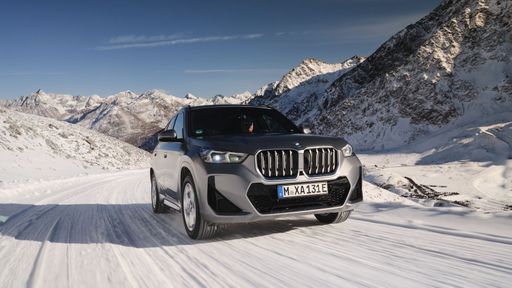
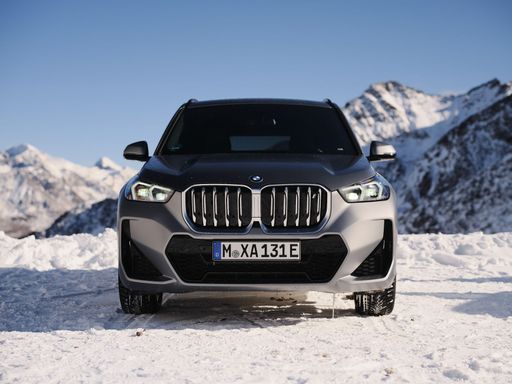
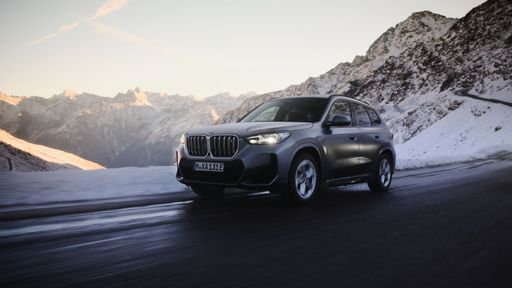
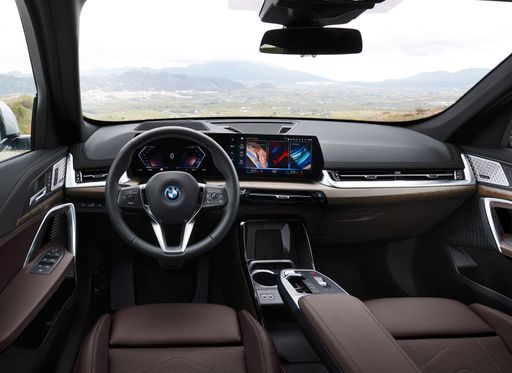
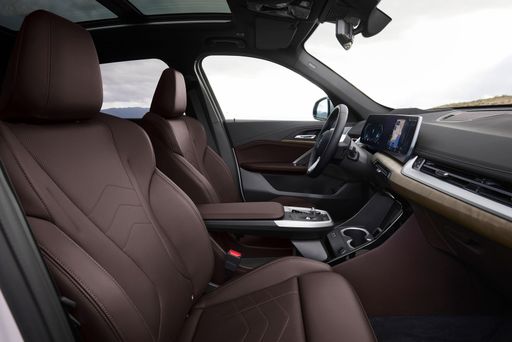
Skoda Elroq
The Skoda Elroq is a cleverly packaged family SUV that mixes roomy practicality with sharp, modern looks, making it an easy pick for buyers who prefer common sense over flash. On the road it's composed and user-friendly, with thoughtful interior details that turn everyday driving into something pleasantly efficient — a sensible companion with a wink.
details
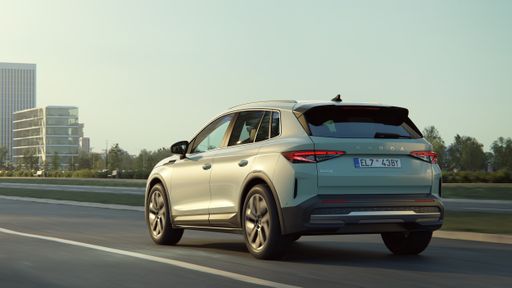
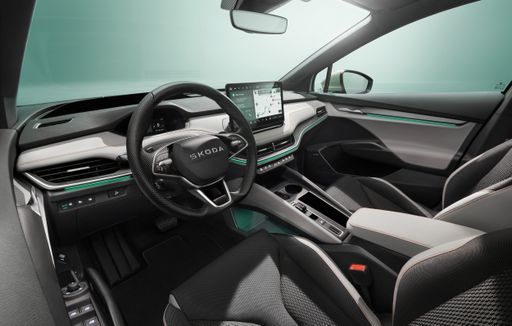

|

|
|
|
|
Costs and Consumption |
|
|---|---|
|
Price
41800 - 54600 £
|
Price
29100 - 45500 £
|
|
Consumption L/100km
-
|
Consumption L/100km
-
|
|
Consumption kWh/100km
15.8 - 17.1 kWh
|
Consumption kWh/100km
15.2 - 16.5 kWh
|
|
Electric Range
436 - 463 km
|
Electric Range
377 - 573 km
|
|
Battery Capacity
64.80 kWh
|
Battery Capacity
52 - 79 kWh
|
|
co2
0 g/km
|
co2
0 g/km
|
|
Fuel tank capacity
-
|
Fuel tank capacity
-
|
Dimensions and Body |
|
|---|---|
|
Body Type
SUV
|
Body Type
SUV
|
|
Seats
5
|
Seats
5
|
|
Doors
5
|
Doors
5
|
|
Curb weight
1940 - 2085 kg
|
Curb weight
1953 - 2268 kg
|
|
Trunk capacity
490 L
|
Trunk capacity
470 L
|
|
Length
4500 mm
|
Length
4488 mm
|
|
Width
1845 mm
|
Width
1884 mm
|
|
Height
1616 mm
|
Height
1608 - 1625 mm
|
|
Max trunk capacity
1495 L
|
Max trunk capacity
1580 L
|
|
Payload
495 kg
|
Payload
470 - 531 kg
|
Engine and Performance |
|
|---|---|
|
Engine Type
Electric
|
Engine Type
Electric
|
|
Transmission
Automatic
|
Transmission
Automatic
|
|
Transmission Detail
Reduction Gearbox
|
Transmission Detail
Reduction Gearbox
|
|
Drive Type
Front-Wheel Drive, All-Wheel Drive
|
Drive Type
Rear-Wheel Drive, All-Wheel Drive
|
|
Power HP
204 - 313 HP
|
Power HP
170 - 340 HP
|
|
Acceleration 0-100km/h
5.6 - 8.6 s
|
Acceleration 0-100km/h
5.4 - 9 s
|
|
Max Speed
170 - 180 km/h
|
Max Speed
160 - 180 km/h
|
|
Torque
250 - 494 Nm
|
Torque
310 - 679 Nm
|
|
Number of Cylinders
-
|
Number of Cylinders
-
|
|
Power kW
150 - 230 kW
|
Power kW
125 - 250 kW
|
|
Engine capacity
-
|
Engine capacity
-
|
General |
|
|---|---|
|
Model Year
2022 - 2023
|
Model Year
2025
|
|
CO2 Efficiency Class
A
|
CO2 Efficiency Class
A
|
|
Brand
BMW
|
Brand
Skoda
|
Is the BMW iX1 offered with different drivetrains?
The BMW iX1 is available as Front-Wheel Drive or All-Wheel Drive.
The prices and data displayed are estimates based on German list prices and may vary by country. This information is not legally binding.
